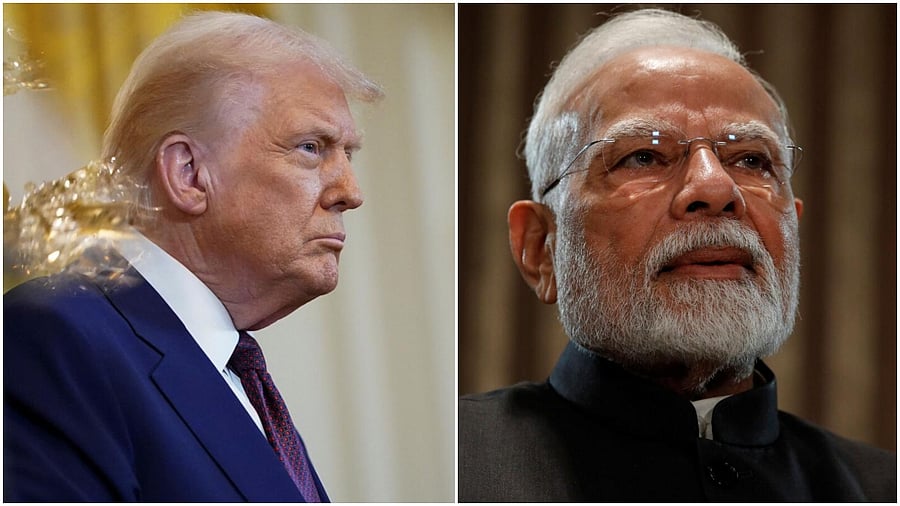
US President Donald Trump(L), PM Narendra Modi.
Credit: Reuters Photo
New Delhi: With the United States brushing aside India’s views to applaud Pakistan’s “continued success in containing terrorist entities” and reiterating its claim to have brokered the May 10 ceasefire between the two South Asian nations, uncertainty looms large over Prime Minister Narendra Modi’s meeting with President Donald Trump next month.
Speculation is rife over Modi’s visit to New York for the United Nations General Assembly next month and the possibility of his meeting with Trump, either in New York, on the sidelines of the conclave, or in Washington, D.C. New Delhi, however, has not yet confirmed his participation at the high-level general debate of the 80th session of the UNGA, let alone his meeting with Trump, who of late imposed 50% tariff on all imports from India to the US.
A source in New Delhi told DH that a meeting between Modi and Trump could be explored only if the two sides could make at least some progress towards ending the impasse in the negotiation for the proposed trade deal. Besides, according to the source, the bilateral relations came under stress due to Trump’s relentless claims about his role in brokering the May 10 ceasefire between New Delhi and Islamabad, as well as his administration’s bonhomie with the Pakistan Army and blatant disregard for India’s views on the export of terrorism from Pakistan and areas under the control of Pakistan.
The diplomats of Pakistan and the US held the latest round of the bilateral counterterrorism dialogue in Islamabad on Tuesday. The two sides issued a joint statement, which noted the US applause for “Pakistan’s continued successes in containing terrorist entities” that posed “a threat to the peace and security of the region and the world”. The US also expressed condolences for the loss of civilians and members of law enforcement agencies in terrorist incidents in Pakistan, including the “barbaric Jaffar Express terrorist attack” on March 11, and the “bombing of a school bus in Khuzdar” on May 21 – the incidents, which Islamabad blamed on India. The allegations were refuted by New Delhi.
The latest claim about the Trump Administration’s role in ending the May 7-10 military flare-up between India and Pakistan came from the US State Department spokesperson Tammy Bruce, who said that the conflict between the two South Asian neighbours could have “developed into something horrible”. She said that stopping the “potential catastrophe” had been “a very proud moment” for the US.
New Delhi, over the past three months, repeatedly refuted the US claim about brokering the ceasefire that ended the four-day cross-border military offensive and counter-offensive between India and Pakistan. Modi, himself, dismissed the claim during a phone call with Trump, himself, on June 17, as well as during a debate in the Lok Sabha on July 29. Trump and his administration, however, did not relent and continued to claim credit for the truce between the two South Asian neighbours. Pakistan, however, endorsed the US president’s claim and nominated him for the Nobel Peace Prize.
Trump, himself, on June 18 hosted Pakistan Army chief Asim Munir, whom New Delhi accused of provoking the April 22 carnage in J&K with an incendiary speech. Munir again visited the US last week, attended the farewell ceremony of General Michael Erik Kurilla, the outgoing commander of the US Central Command, at the Tampa Convention Centre in Florida on August 8. Kurilla, who had called Pakistan a phenomenal counterterrorism partner of the US just a few weeks ago, relinquished command to Admiral Brad Cooper of the American Navy.
Munir purportedly said at a dinner hosted in his honour that Pakistan was a nuclear power and, if it ever had to go down, it would take half of the world with it. He also slammed India for suspending its Indus Water Treaty with Pakistan in the wake of the killing of 26 people, mostly tourists, at Baisaran near Pahalgam in J&K on April 22. He said that Pakistan would wait for India to complete building the dams on the Indus and its tributaries and then fire missiles to destroy the dams, according to the reports received by New Delhi.
What also raised the hackles in New Delhi was a statement issued by the US Joint Chiefs of Staff, affirming that the military partnership between America and Pakistan was necessary for nuclear security in South Asia. The statement was issued after Munir had a meeting with General Dan Caine in Florida last week.
